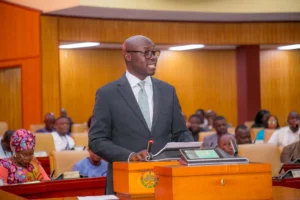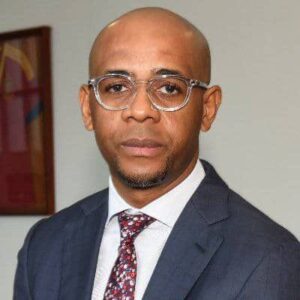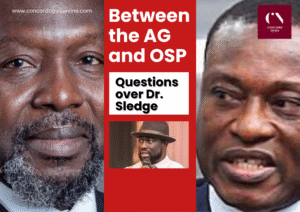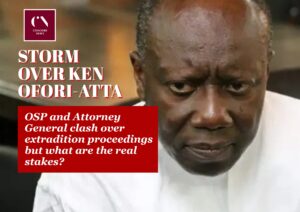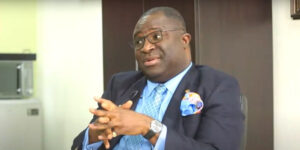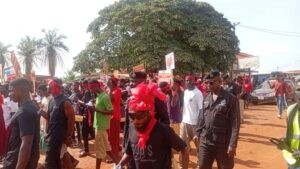NDC, NPP fight over debate
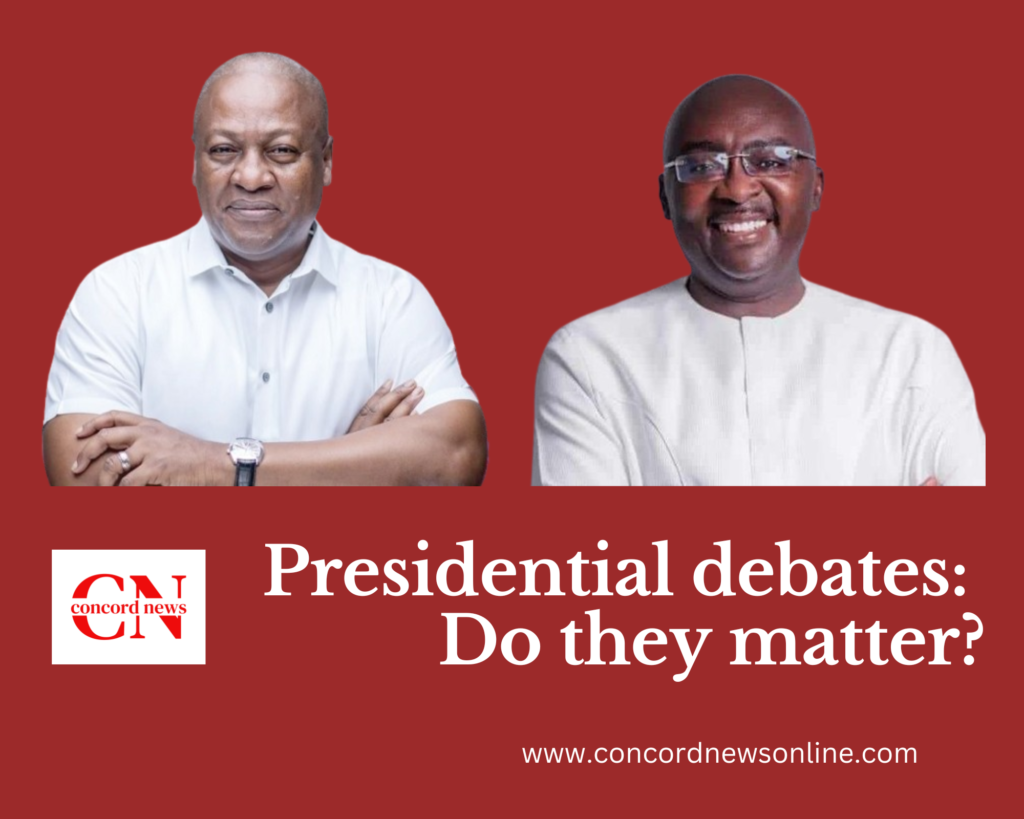
JOYCE KPEGLO analyses the impact of presidential debates as the NPP and NDC haggle over the importance of pre-election debates.
The ruling NPP and the Opposition NDC have been engaged in intense debates over the importance of presidential debates in the upcoming 2024 elections.
The NPP was first to throw the gauntlet when Dr Mahamudu Bawumia, Vice President and Presidential candidate for the NPP dared former President and NDC Presidential candidate for a debate.
“I look forward to have a debate with John Mahama about the nation, the economy, and governance,” Dr. Bawumia remarked. Former President John Mahama is yet to respond to this challenge, however, the spokesperson for Mahama’s campaign team, however, rejected requests for a pre-election debate between the NDC and NPP presidential candidates prior to Dr. Bawumia’s remarks.
As expected the NDC, which has a convincing lead in all credible polls so far, have outrightly rejected any such invitations for debate. Any political strategist worth his salt will say John Mahama has no business engaging in any debate with Dr. Bawumia.
The NPP had played similar games in the past, precisely in 2016, when it refused to allow its Presidential Candidate, Nana Akufo Addo to debate the then President, John Mahama. Political Marketing expert, Professor Kobby Mensah of the University of Ghana, explained why the NDC is right to reject such calls.
“Now I think that position has to be constant. You couldn’t actually call for a debate when you are on the bad foot because the country is not behind you, you think that debate is good for you, but then when you were actually absolutely in line with the country you did not think the debate was good,” Prof. Mensah stated.
The case for presidential debates, therefore, suffers from a system whereby leading contenders in elections are hesitant to risk exposure.
This could have implications for the growth of our democracy.
Debate is an essential intellectual discourse that sheds light on issues and explores various perspectives on these issues. Intrinsic in this art of speech is the ability to persuade an audience to vote in favour of your stance.
Presidential debates are usually held among presidential candidates prior to elections with the aim of electorates making informed decisions. The candidates are asked crucial questions in regards to issues affecting the economy and other important sectors of the country, and each participant does their best to answer with policies planned out to address these issues when elected. Candidates who may be invited to have debates 2 or 3 can choose to accept or decline the call for a presidential debate.
These debates, which garner millions of viewers have been going on for a while. Developed democracies like the US, however, are where they are more common. Nielsen Media Research reports that more than 59.5% of American TV homes saw Nixon and Kennedy’s historic debate on September 26, 1960, which was the first presidential debate to be televised on television.
Other presidential debates, such the one between Jimmy Carter and Ronald Reagan on October 28, 1980, drew a massive audience of 80.6 million viewers. The two leading contenders from each party, Barack Obama and Mitt Romney, participated in three presidential debates in 2012; Joe Biden and Paul Ryan debated for the vice presidency.
On June 27, 2024, current presumed Democratic nominee Donald Trump as well as previous presumed Democratic nominee Joe Abide participated in the first general election debate, which was sponsored by CNN. The subsequent debate is scheduled for September 10, 2024, and it will be sponsored by ABC.
Ghana is the only nation in West Africa to have hosted four consecutive presidential debates, making it a historic accomplishment and a sign of the nation’s democratic growth. In 2000 hosted Ghana’s witnessed its first-ever presidential debate which featured Mr. K.A Kufuor. NDCs J.J Rawlings who was the president then did not participate in the debate. More presidential debates were held in 2004, 2008, and in 2012 which was the debate between former president John Dramani Mahama and Nana Akufo Addo.
Do Presidential debates influence voters?
Following the presidential debate between Joe Biden and Donald Trump, many people claimed that Trump had outperformed Biden in every way. Democrats and commentators alike were urging Biden to withdraw from the campaign due to his dismal performance.
According to a Washington DC report from June 28, 2024, a two-wave 538/Ipsos poll of likely voters conducted in the days preceding and immediately following the debate found that most likely voters who watched the first 2024 Presidential debate thought Republican candidate Donald Trump performed the best. Still, fewer than half of those who saw the debate said Trump did a good or excellent job.
According to the study, there was a modest fall in the perception, especially among Democrats, that President Joe Biden is mentally and physically qualified to serve as president following the debate. Nevertheless, many likely voters indicated that they are still inclined to consider voting for Biden despite his unimpressive performance.
The following are statistical details of the Ipsos Poll:
Most debate watchers said Trump performed best in the debate.
- Three in five debate watchers said Trump performed best in the presidential debate, compared to 21% who said the same of Biden. One in five (19%) said they don’t know who performed best.
- That said, under half of debate watchers say Trump’s performance in the debate was good or excellent (40%). A quarter said he had a mixed performance (25%), while one in three said his performance was poor or terrible (33%).
- Three in four debate watchers said Biden’s performance was poor or terrible (73%). Just 8% said his performance was excellent or good.
Ratings of Biden’s mental and physical fitness to be president declined following the debate.
- Before the debate, 27% of likely voters rated Biden as good or excellent when it came to his mental fitness to be president. Following the debate, that level declined to 20%. The decline was steepest among Democratic respondents, going from 56% before the debate to 42% after the debate.
- These levels also saw sharp declines among Black respondents (-15 percentage points), those aged 65+ (-11), and those with a Bachelor’s degree or higher (-10).
- Ratings of Trump’s mental (39% pre-debate, 41% post-debate) and physical (43%, 45%) fitness were stable.
Despite the poor ratings of Biden’s performance, few respondents were no longer considering voting for Biden.
- Among respondents who completed both the pre- and post-debate survey, just 4% are giving less consideration to voting for Biden. In comparison, 2% are giving less consideration to voting for Trump following the debate.
- As a whole, in the pre-debate wave, 44% of respondents reported that they were considering voting for Biden. This was unchanged in the post-debate wave, where 46% said the same of Biden.
- The percent of respondents considering voting for Trump (44% pre-debate, 44% post-debate) and independent candidate Robert F. Kennedy Jr. (18% pre-debate, 18% post-debate) was also unchanged.
A few days ago, President Joe Biden declared that he is stepping down from the Presidential race and endorsed Vice President, Kamala Harris to be the new nominee for the democrats. Although he has not provided detailed reasons for his decision, there are speculations that his decision to step down is due to his poor performance in the presidential debates.
It is worthwhile to share a study on the impact of parliamentary debates on the 2016 elections, even though it has nothing to do directly with the presidential debates. It was conducted by Sarah Brierly a doctoral researcher at UCLA, Eric Kramon is an Assistant Professor of Political Science and International Affairs at George Washington University and George Ofosu also a researcher at UCLA. They discovered that electoral debates affect voters’ opinions because, on a seven-point rating system, voters’ positive perceptions of all the candidates rose by roughly 5% after watching the debate. Additionally, they discovered that after witnessing the debates of minor parties, voters’ assessments of them increased by 11.5%. Lastly, their findings showed that debates improve evaluation of the opposition party among strong partisan voters and could make these partisan voters become more favorable to their rival party.
A summary statement by Sarah Brierly, Eric Kramon and George Ofosu states “Both televised and radio debates increase informed and tolerant voter behavior, boding well for peaceful elections in young democracies”.
Critiquing the transparency of organizers of Presidential debates:
The organizers of the presidential debates in Ghana and the US have come under criticism on a number of occasions. The Commission on Presidential Debates (CPD) is an American organization that organizes and conducts research and educational initiatives in connection with the presidential and vice-presidential debates. All of the general election presidential debates were arranged by the CPD between 1988 and 2020.In 1987, the Democratic and Republican political parties collaborated to form the nonprofit organization known as the CPD.
In April 2022, the Republican National Committee voted unanimously to withdraw from the commission; the committee chair called the organization’biased’ and stated that they would find ‘newer, better debate platforms’ for future Republican nominees. Also, Jen O’Malley Dillon, chairwoman of Biden’s campaign, informed the Commission on Presidential Debates that Biden will not be taking part in its events claiming that the commission had not enforced its rules on Donald Trump.
Other criticisms of the commission has been in regards to its format and schedule. In November 2023, the CPD announced its plans for three debates to be held on September 16,October 1 and October 9. However Both Democrat and Republican parties indicated their concerns that the dates for the debates are too late in the campaign season.
Later on, Biden and Trump campaigns struck a deal to circumvent the CPD and participate in two confirmed debates one by CNN which was held on June 27 and another tone held on ABC News on September 10 breaking a longstanding tradition of debates organized under the auspices of the CPD.
The Institute of Economic Affairs (IEA) in Ghana holds the reputation of organizing presidential debates in Ghana. It was founded in 1989 in Accra when the country was still under military rule.
The IEA believes that “those who wish to give must subject themselves to probing questions by the people, to ensure that they understand their concerns, and have the capacity to address them.”
The reputation of IEA as a transparent and accountable organizer of presidential debates was brought into question after the 2012 Presidential debate when the now Vice-Presidential candidate for the New Democratic Congress, Professor Naana Jane Mensah was a moderator of the debate. Subsequently, she was appointed as the minister of Education when Mahama won the 2012 presidential elections. The reason for the suspicions regarding the openness of the debate moderation seems to be her appointment that came after the presidential debate. In an interviewon ‘FRONT LINE’, the breakfast programme of Accra, London-based Rainbow Radio 87.5fm, Dr. Mathew Opoku Prempeh, popularly known as NAPO, of the New Patriotic Party had accused the Institute of Economic Affairs of leaking questions to President John Dramani Mahama during the 2012 presidential debate in Tamale.
Considering the range of research, polls and even the reactions of a global audience on social media, it is reasonable to say that presidential debates may have significant impact on the electorate and the extent of this influence varies depending on political party and the demographics of the audience.
In order to maintain their status as reputable pioneers of transparent and responsible presidential debates, the organizers of these events have a crucial role to play in guaranteeing informed political discourse. They must thus improve upon their different organizational rules and decisions.
To crown it all, the essence of Media, radio, television, and the internet in developed and young democracies is also emphasized. The crucial function that the media serves in educating the public and holding governments accountable is demonstrated by the IEA airing presidential debates on GBC and Republican and Democratic acceptance of CNN and ABC as alternative platforms for debate instead of the commission on presidential debates. This significant role of informing citizens and keeping governments accountable should never be underestimated.

